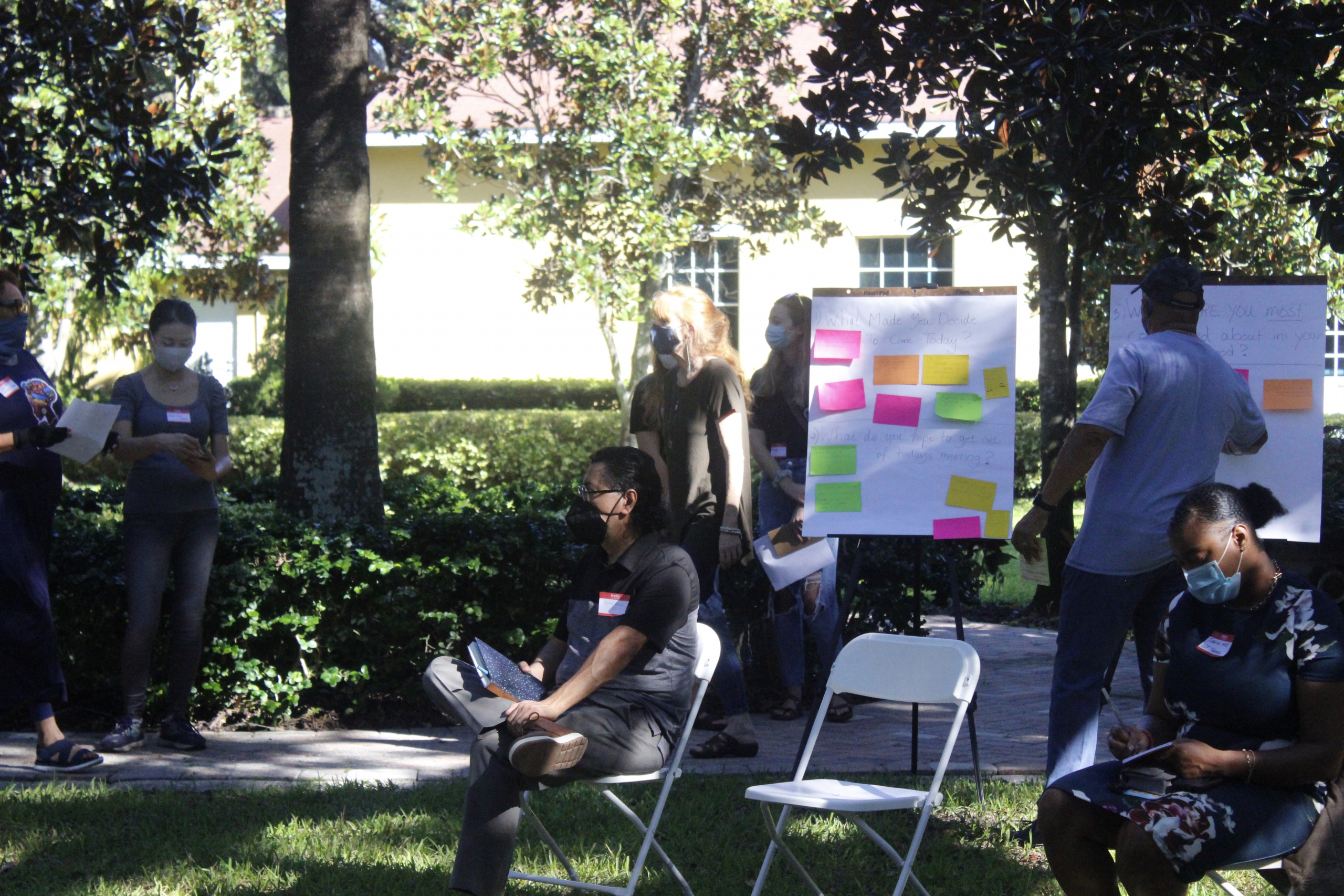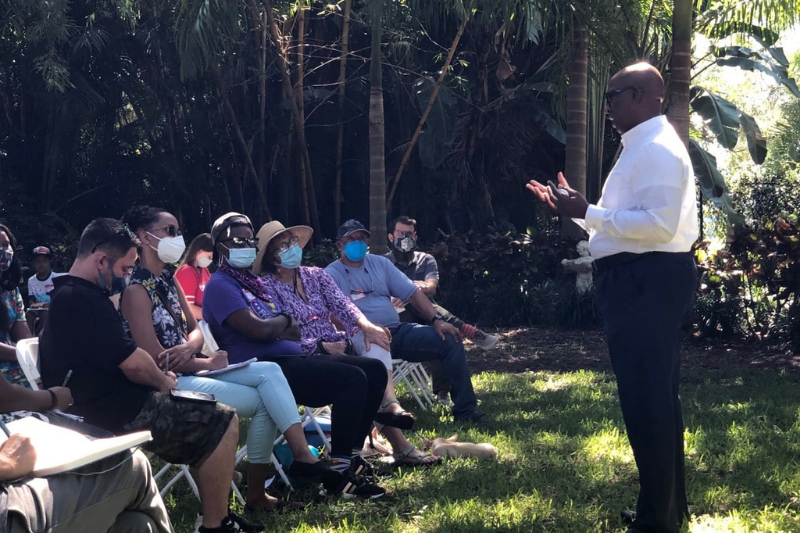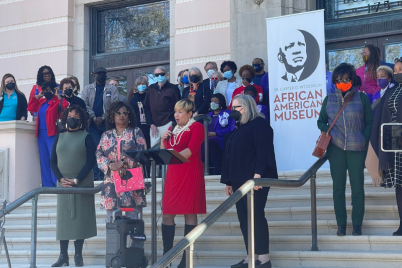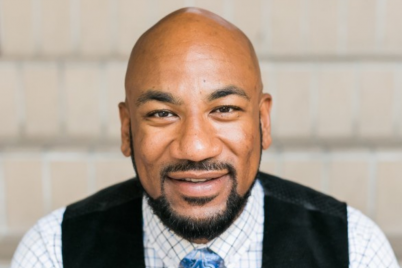Mayoral candidate Ken Welch fielded questions from the crowd on environmental justice at the iCAR town hall meeting held Sept. 25 at the Carter G. Woodson African American Museum.
MARK PARKER, Staff Writer
ST. PETERSBURG — The Initiative on Coastal Adaptation and Resilience (iCAR) held its first in a series of meetings on climate resiliency and environmental justice at the Carter G. Woodson African American Museum last Saturday.
Founded in 2015 by USF St. Petersburg professors Dr. Barnali Dixon, Dr. Rebecca Johns, and Dr. Donny Smoak, iCAR’s mission is to build awareness of climate impact on the region, identify research gaps as it relates to certain neighborhoods, and help local organizations develop the skills necessary for climate resiliency.
The Foundation for a Healthy St. Petersburg sponsored last Saturday’s town hall meeting.
Students from USF, USFSP, and the University of Tampa volunteered their services for the event, which was held in the lush Legacy Garden behind the Woodson Museum. The students registered attendees and passed out fliers, ran a kids table with activities for children, and served pizza – of which there was enough to feed a small army – to guests.
While the topics were serious and the discussions sometimes intense, the mood was relatively light, and the event was informal. Guests were asked to fill out large sticky notes with their questions and place them on a poster board, and the experts on the topic answered each question. Other posterboards were placed around the meeting displaying maps with specific data as it relates to patterns of risks and specific resiliency issues.
The maps were made possible by the Community Resiliency Information Systems (CRIS). CRIS is a web-based, interactive tool designed by iCAR to identify unique resiliency needs at the community level, and solutions are customized by neighborhood to ensure equitable climate resiliency. CRIS allows residents from diverse communities to communicate their resource and information needs to local and state officials. Passing this information and local concerns to leaders and legislators was a key focus of the event.

The iCAR town hall meeting was held Sept. 25 in the Legacy Garden of the Carter G. Woodson African American Museum
CRIS combines physical data such as storm surge, flooding, and sea-level rise with environmental hazards, socioeconomic data, live survey data, and sensor data to create heat maps. The most heavily discussed map on display showed a disproportionate amount of pollutants in the air around the Midtown area of St. Pete.
However, researchers did point out that as bad as the map looked, more testing needed to be conducted in Midtown and other areas of the city before they could draw any more specific conclusions.
“This area right here, the area north of Lake Maggiore – which is all Midtown, Childs Park – this is the highest risk of cancer from toxins in southern Pinellas County,” said Johns.
Dixon said they recently put a sensor in Bartlett Park, and she is seeking more funding to put sensors in other areas.
“One of the great things about this tool is that it’s flexible,” said Johns. “We don’t currently have a public health module, but we can create one if that’s what the community wants.”
Dr. Henry Alegria, a professor of chemistry at USF, succinctly said that “science costs money.”
“So, we’re doing what we can with the funding that is available,” he said. “If we were to get more funding, we can add more things, measure more things, and we could get them installed in more locations to get a more granular picture of what’s happening and make comparisons county-wide.”
Alegria added that residents who are currently experiencing the effects of environmental inequities must get involved in these programs and make their voices heard, as the squeaky wheels are the ones that get the most oil.
“We want equity,” he said.
Former county commissioner and current mayoral candidate Ken Welch fielded questions from the crowd. He said it is a fact that the climate will continue to change over the following decades, “and we have to respect the science and what it says.”
“And the science tells us that there is a disproportionate impact on lower-income communities with sea-level rise,” said Welch. “The science has to dictate our decision making.”
In collaboration with a diverse set of community partners, iCAR is hosting Dr. Robert Bullard on Oct. 20 as the keynote speaker for its annual workshop on climate resiliency. Bullard will speak about the intersections of environmental and climate justice and strategies for moving the community forward to equitable resilience.
The virtual keynote address will take place at 7:30 p.m. Click here to RSVP.
If you could not attend the town hall meeting at the Woodson last Saturday, please consider sharing your thoughts through this survey link. This is not research and is confidential. It is merely a tool for collecting ideas about community concerns that can inform our community conversation with Bullard.
Your ideas will be added to the summary of concerns we have collected from the town hall. Please complete your response by Oct. 4 to be given full consideration.
Click the link to take the survey https://forms.gle/5MxUQEUSX1EsJuoC8
Follow iCAR on Facebook at www.facebook.com/iCARatUSFSP.
An earlier version of this article incorrectly stated that the Sierra Club was a sponsor of this event.








